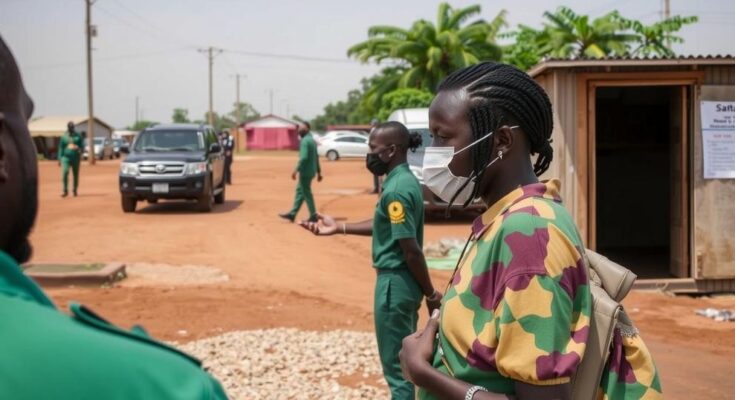The South Sudanese government’s decision to remove checkpoints on key highways has elicited mixed reactions from the public. While many commuters express relief at the reduction in travel delays, concerns regarding safety and increased criminal activity persist. The military assures ongoing surveillance, despite existing issues related to low morale and delayed salaries among troops.
The recent directive from the Government of South Sudan to eliminate checkpoints along major highways, notably the Juba-Bor route, has elicited a spectrum of reactions from the public, including residents, commuters, and security analysts. While many travelers and Bor inhabitants express optimism regarding enhanced mobility, there are significant concerns about increased vulnerability to criminal activities in the absence of formal security presences.
President Salva Kiir’s order for the dismantling of illegal checkpoints across the nation has been confirmed by the South Sudan People’s Defense Forces (SSPDF). Commuters such as Chol Chopa from Bor have welcomed the decision, praising the reduced travel delays; however, they also express apprehension about potential security threats as armed groups may seize the opportunity presented by the military’s withdrawal. “The absence could be dangerous as bandits could take advantage of the situation,” remarked Mr. Chopa.
Conversely, a faction of the community perceives the checkpoint removal favorably. Victoria Yom Geu articulated this perspective, asserting that the dismantling of roadblocks could streamline traffic, minimize illicit tax collection, and ultimately bolster the local economy. She stated, “We see it as reducing insecurity and making trade more efficient.” Similarly, Mach Anyang, a frequent traveler on the Juba-Bor route, endorsed the initiative, indicating a decrease in frustrations caused by soldier extortion along the road.
Amid these varying opinions, SSPDF spokesperson Major General Lul Ruai Koang has reassured the public that although the illegal checkpoints have been taken down, the army will continue to monitor the situation through strategic patrols to ensure public safety. He emphasized, “We are monitoring the roads and patrols will continue where needed.”
Nonetheless, challenges persist, notably the delays in government employee salaries, which have raised concerns regarding military morale and potential repercussions for security, as reports indicate some soldiers’ abandonment of duties due to unpaid wages. As South Sudan navigates the delicate equilibrium between enhancing roadway accessibility and maintaining security, public sentiment remains divided regarding the broader implications of this policy shift.
In South Sudan, the network of checkpoints has been a contentious issue, particularly affecting travel and trade efficiency across major routes. These checkpoints were established under the guise of enhancing security; however, they often became sources of extortion and economic burden on travelers. The recent decision to dismantle these checkpoints follows a broader strategic approach by the government to improve trade and safety while attempting to address the regional challenges posed by banditry and armed groups. A balance must be maintained between accessibility and public safety, especially in a nation where security forces have been hampered by issues such as low morale and skepticism from the populace.
In summary, the removal of checkpoints along South Sudan’s major highways has temporarily improved travel efficiency but has also raised valid concerns about the safety of commuters. While some residents view this change as an opportunity for economic enhancement, others remain wary of the threats posed by potential criminal activities. The government’s assurance of continued military presence through patrols aims to alleviate some of these apprehensions. The true efficacy of this policy will depend on the government’s capability to ensure safety while fostering an environment conducive to trade and mobility.
Original Source: www.radiotamazuj.org




